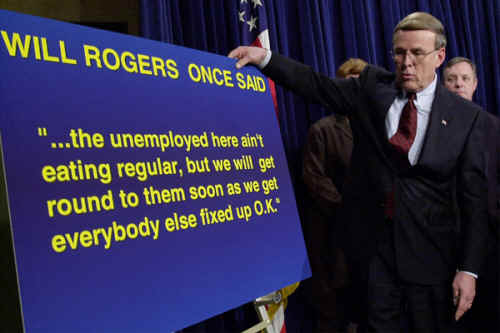Return to Contents Page
|

Senator Byron Dorgan (D-ND) points to a
graphic that sums up the GOP Economic Stimulus Plan.
White House, Congress Face Full Agenda
The
While House and a divided Congress face daunting challenges: dealing
with a full agenda of legislative issues while tiptoeing through the
political minefields of a looming election cycle.
At his inauguration, President Bush promised to be a “unifier, not a
divider.” Bush inherited a $236 billion budget surplus. The
government’s fiscal house was in order, with those surpluses expected
to continue for the next two decades.
Those surpluses protected both the Social Security and Medicare trust
funds far into the future, while leaving enough to pay off the entire
federal debt.
The President and his party in Congress could have built on that
foundation, but chose a different path.
Now Bush urges Congress to pass his so-called “economic stimulus”
package to jump-start the economy. His proposal merely hands even more
wealth to Big Business and the wealthy with little left for working
families.

Jobless workers in New York line up at a job
expo. Unemployed workers need extended unemployment, health benefits and
training opportunities.
Those working families need extended jobless benefits and health care, a
Patient’s Bill of Rights, a prescription drug plan for Medicare, a
higher minimum wage, and strict workplace safety rules.
“What we don’t need, and won’t accept, is a phony stimulus package
that hands over millions of our tax dollars to corporations like
Enron,” declared IAM President Tom Buffenbarger
Most political observers see little prospect for meaningful legislation
during this congressional session as both parties prepare for the coming
campaign season.
In his State of the Union message, Bush offered little more than Band
Aids to working families. He mentioned “jobs” just eleven times. He
mentioned unemployment just once.
Even Federal Reserve Board Chairman Alan Greenspan endorsed extended
jobless benefits. He admitted that the current 26 weeks of unemployment
benefits law is not enough in today’s jobs-tight economy.
More than 750,000 workers exhausted their unemployment benefits without
finding new jobs last year, not including the surge in layoffs that
followed Sept. 11.
“Congress and the White House had a chance to help working
families and they chose not to,” said Buffenbarger. “We can’t let
them get away with it.”
|